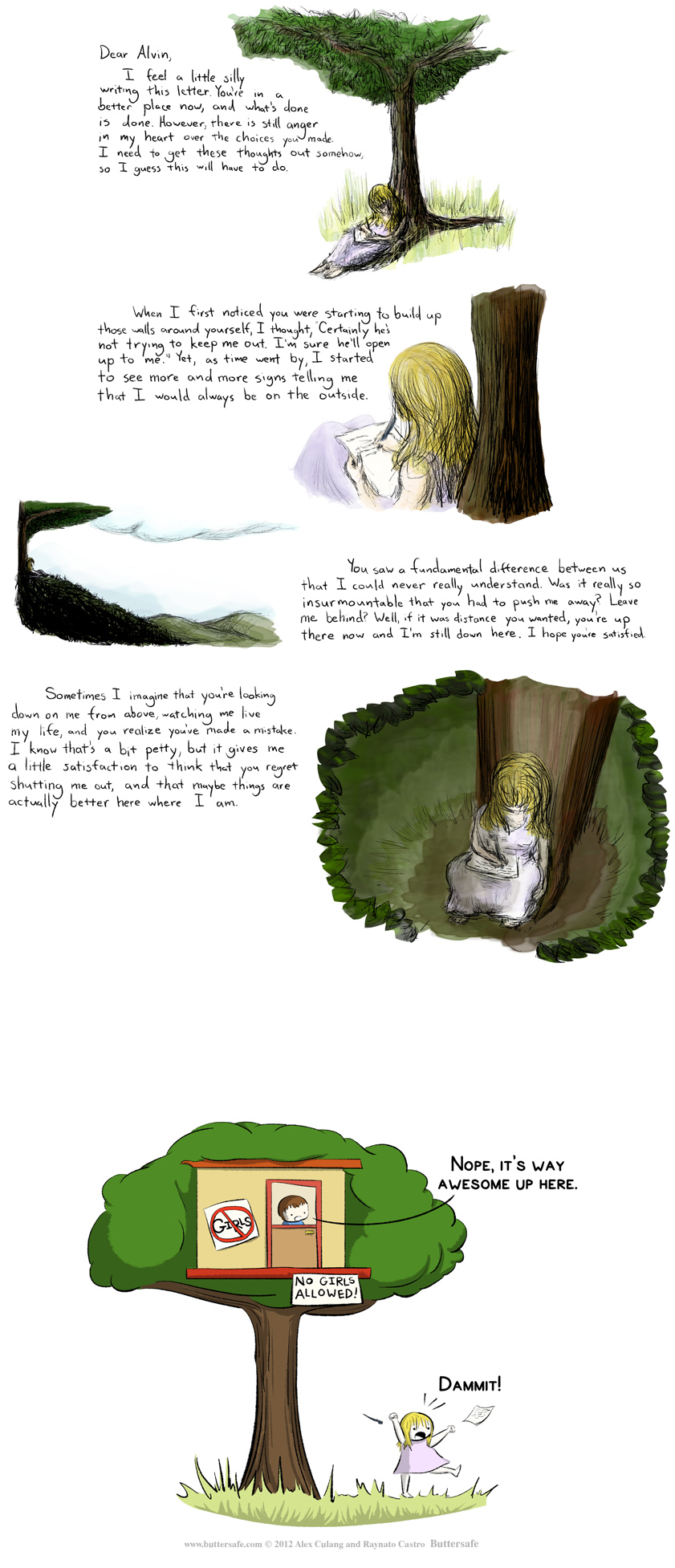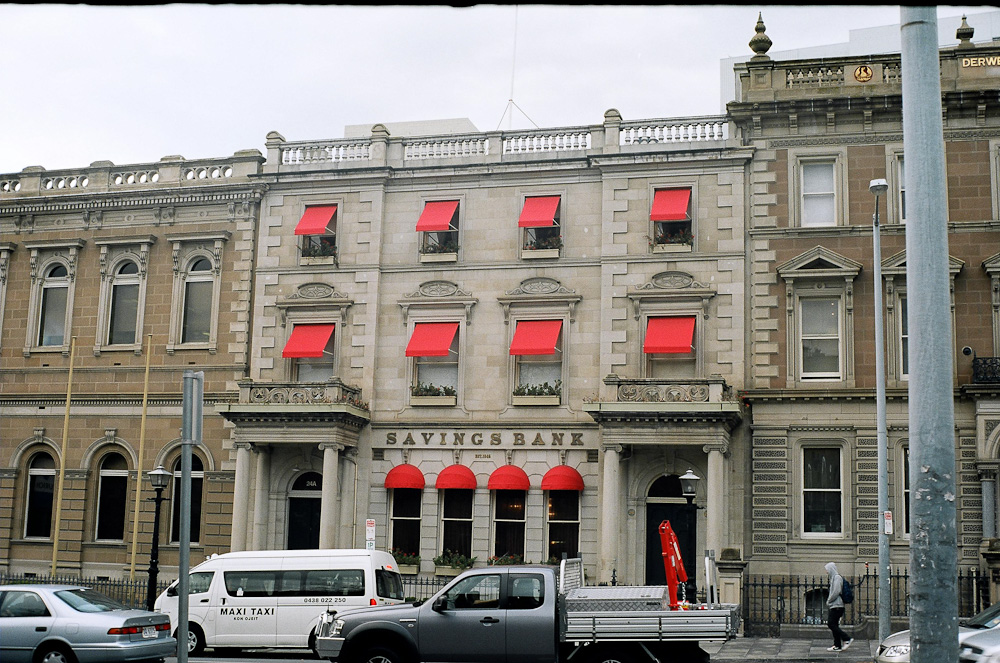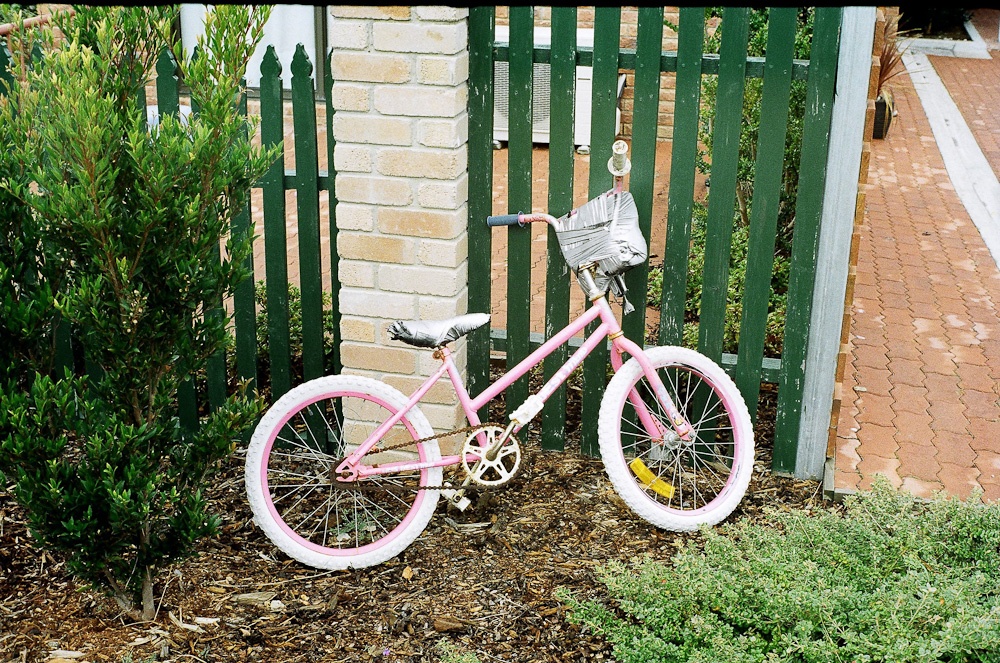A 20 minute short on Ghost Recon. Seriously well produced.
Archive | 2012
Through the Fire and the Flames on Floppies
Man, we can’t even play this properly on Guitar Hero/Rock Band.
And this guy rigged up floppy drives to do it.
Buttersafe » Swimsuit Season
via Buttersafe » Swimsuit Season.
Reminds me of this other comic.
What happens if the social web as we know it isn’t actually all that social?
The idea that a Web site could deliver a more friendly, interconnected world is bogus. The depth of one’s social network outside Facebook is what determines the depth of one’s social network within Facebook, not the other way around. Using social media doesn’t create new social networks; it just transfers established networks from one platform to another. For the most part, Facebook doesn’t destroy friendships—but it doesn’t create them, either.
On the face of it, it seems crazy: social networking that isn’t social. But like it or not, Facebook, Twitter, MySpace, and your social network of choice are pretty much everywhere. But what does that mean for you? I mean, aren’t you the one that decides what to post, where? Aren’t you the one that decides how many friends you have, or how privy other people are to your innermost secrets, or at least the ones you choose to share with your fellow socialites? While at least some of that may be true, it doesn’t mean that social networking is all that social. Let me explain.
Almost half of the Australian population uses Facebook. And I can tell you from first-hand experience that Facebook is great! Fantastic, even. When Facebook first launched, I remember the stories of how it meant people could keep in touch with people they thought they had all but lost contact with. There was quite a bit of press about people getting in touch with their teachers from high school, or with long-lost relatives, cousins, friends who had moved to other countries. For most people, that was a great thing: it meant that people didn’t have to track down relatives by calling sixteen different individuals just for an email address, or having to go and do the legwork to get in touch with someone from high school. Anyone could just add their friend on Facebook, and that was that. Easy, right?
Thanks to this thing called the Internet, Facebook suddenly made the world a smaller place. Now it doesn’t matter what country your friends are in, or whether a few streets away, or a few thousand kilometers, because as long as they’re online, you can talk to them in real-time. It doesn’t matter how separated by geographical distance you are, because the internet is everywhere. It doesn’t matter if you can’t see your friends in person on a weekly or monthly basis, because the internet is always there.
To reiterate my original question: what happens if social media isn’t all it’s chalked up to be? What happens, instead of connecting people (hi Nokia!), the social web just serves as a reminder for how lonely we all are?
Granted, that’s a rather pessimistic way of looking at things. Perhaps, then, the above statement could be rephrased as such: as well as connecting people, what happens if the social web also serves as a reminder for how lonely we all are? I have friends that only post the most enthusiastic stuff. They’re seemingly always happy. They’re seemingly always content, and never upset, sad, or anything else.
One one hand, that’s great, you know? If they’re happy, I’m happy that they’re happy. But on the other, you have to wonder: if someone is posting about how much they love their significant other, or how great their life is, and I’m here reading their happiest-ever-status, doesn’t that mean my own life is a miserable mess by comparison?
When I scroll through page after page of my friends’ descriptions of how accidentally eloquent their kids are, and how their husbands are endearingly bumbling, and how they’re all about to eat a home-cooked meal prepared with fresh local organic produce bought at the farmers’ market and then go for a jog and maybe check in at the office because they’re so busy getting ready to hop on a plane for a week of luxury dogsledding in Lapland, I do grow slightly more miserable. A lot of other people doing the same thing feel a little bit worse, too.
It’s this passive consumption that means the social web might not be all it’s chalked up to be, and it’s this passive consumption that means when you read about how great someone else’s life is, your own life will seem less so by comparison.
Real life isn’t like this. You don’t know what the person on the street is feeling. You don’t know what they’re thinking, or how their day is going. If you ask them, you’ll probably find out, but who wants to go around asking total strangers how they’re going, how they’re feeling?
Maybe it’s just me, but sometimes I ask myself if any of this social networking stuff is “worth it”. I wonder if keeping up-to-date with Facebook, or Twitter, is “worth it”. What do I gain? The question, once again, could perhaps be better rephrased as: do all these social networks make me feel more connected with people I care about, or less so?
I’d like to think that social media has made our lives better. In ways, it has: it means we can talk to our friends in a different time zone. Social media, the social web, whatever you want to call it, has meant that we can connect with Mac enthusiasts from all over the world. It means that we can connect with famous photographers, people we look up to, and yes, even our long-lost relatives or friends that we just lost touch with.
But there’s always the other side of social media, the side that everyone seems to ignore just because the advantages seem to outweigh the negatives. The side that says you shouldn’t use the social web to supplement your social activities, but instead use it to complement them. The side that says this “passive consumption” is bad for you.
If you’re wondering by now, you should probably read the entire article by Stephen Marche, but I’ll quote him again anyway because it serves as a nice summary. (The article, if you’re wondering, is about whether Facebook makes us lonely, but most of the topics I’ve covered here are one and the same.)
LONELINESS IS CERTAINLY not something that Facebook or Twitter or any of the lesser forms of social media is doing to us. We are doing it to ourselves. Casting technology as some vague, impersonal spirit of history forcing our actions is a weak excuse. We make decisions about how we use our machines, not the other way around. Every time I shop at my local grocery store, I am faced with a choice. I can buy my groceries from a human being or from a machine. I always, without exception, choose the machine. It’s faster and more efficient, I tell myself, but the truth is that I prefer not having to wait with the other customers who are lined up alongside the conveyor belt: the hipster mom who disapproves of my high-carbon-footprint pineapple; the lady who tenses to the point of tears while she waits to see if the gods of the credit-card machine will accept or decline; the old man whose clumsy feebleness requires a patience that I don’t possess. Much better to bypass the whole circus and just ring up the groceries myself.
There’s some stuff in there that’s for another time, but for now, you’ll excuse me to post about how good — no, great! Fantastic, even! — my life is on all the social networks.
Buttersafe » A Better Place
Film, continued
One of the crazy things I love about film is that your photos can change depending on what film you’re using, how it’s developed, and if you’re getting scans done, how good the scanner is.
It’s like each kind of film has its own character. Each kind of film is unique, different to the next, and I’m not even talking about the difference between B&W, slides/transparencies, or colour negatives, I’m talking about differences in grain type and amount, colour reproduction, dynamic range, and so on.
The differences between different brands and even different labels within the same manufacturer is crazy. Buy Kodak Portra, and you’ll get different/better skin tones than, say, Kodak Gold. Buy Kodak Ektar and, you’ll get much nicer grain than Kodak Ultramax (ISO differences aside). And so on.
It’s one of the things that appeals to me about film: digital is very predictable in terms of what you can expect straight out of the camera, whereas with film the kind of film you’re shooting can have a much greater impact on your photos than what kind of lens you’re using, for example. The differing characteristics from one film to the next give it that special edge over digital. It just adds a bit of variety, you know?
One of the realities of photography is that as you increase the sensitivity, you increase the amount of artefacts that appear in your image. With digital, as you ramp up the ISO you get more noise. With film, as you get a higher-rated film you get more grain. But here’s the rub: film grain resolves detail much better than digital noise does. Not only that, but film grain is much more evenly spread out across the image. Compare that to digital, where noise is essentially just a whole lot of random pixels, and can differ in appearance depending on where it appears in the image (i.e. it’s more pronounced in shadows than it is on subjects).
Don’t get me wrong, film is “worse” for grain at the same sensitivities when compared to digital. My DSLR can practically see in the dark when I’m shooting at ISO 12,800, but things are, not surprisingly, pretty noisy at those kinds of ISOs. At the same sensitivities, digital beats film hands down — but I much prefer the look of film grain to digital noise.
I’ve been asked if I develop my own stuff, and the answer is: no. Not because I don’t want to, but because that’s a whole other can of worms. For now, I get my C-41 (colour negatives) processed and either scanned or printed locally (i.e. Hobart), and I haven’t shot any E-6 (slides/transparencies) but I know that no one in Hobart commercially develops it anymore, and same goes for B&W.
I mean, developing your own film does have its advantages; you’re the only one that gets to see your “work”, you’re totally self-sufficient, and apparently it’s extremely cheap to DIY, but — and here’s the kicker — it’s a lot of extra work. Developing your own negatives requires messing around with chemicals, temperatures, not to mention the fact you need to arrange some kind of total-darkness environment. We haven’t even touched on the problem of needing to digitise your own negatives/slides, requiring a half-decent scanner if you want any kind of quality scans. Consumer flatbeds just don’t cut it.
Make no mistake, developing your own negatives is a whole different ball game. It gives you total control over your photography, but it’s a lot of extra work on top of just taking the shot.
Maybe I’ll start thinking about developing my own if I start taking this any more seriously than just what I’m doing at the moment, but for now, the local lab does acceptable scans, even if they’re not as high a quality that I would like (only 3 megapixels!).
I have a new camera on the way, which is a nice little Olympus point and shoot. I’ve been wanting a film camera as a daily carry for a while now, and maybe this little Olympus will be a good compromise for the time being. At least until I work up the courage to fork out for a Bessa, anyway.



